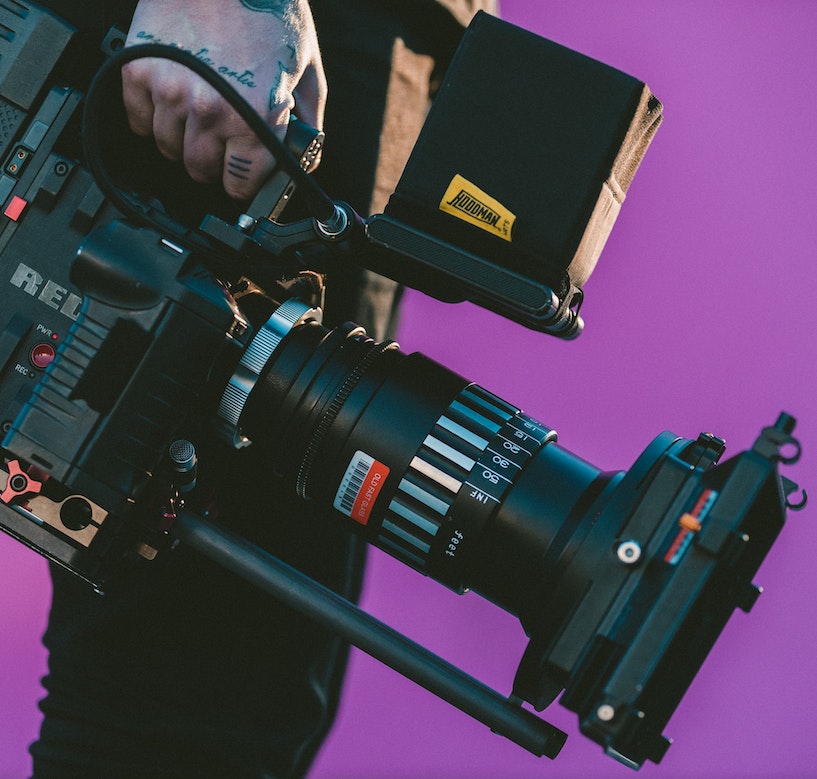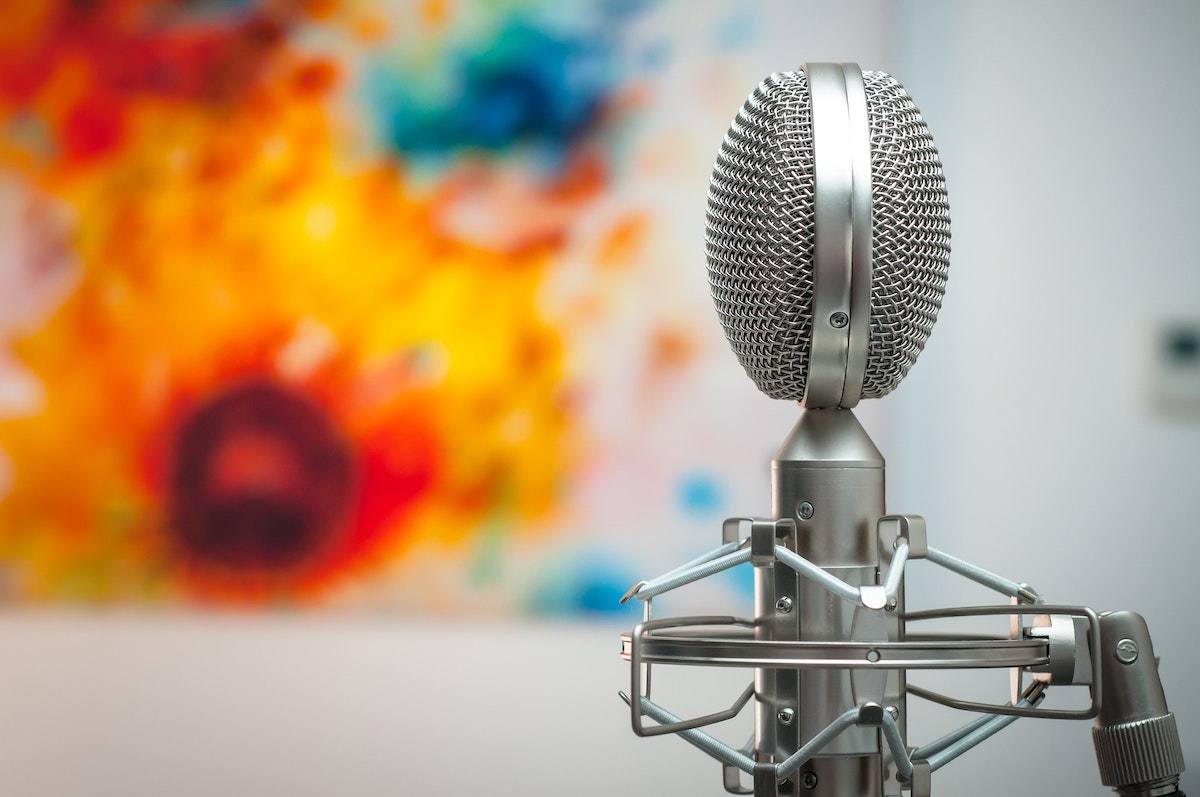Here it is right off the bat: The future of artificial intelligence is now.
“Nah – not yet,” you argue.
No?
Then imagine this:
“Hey Alexa, turn on the lights,” you say.
“Okay,” she replies. But not in her voice. In your voice.
How off-putting would that be – to have an artificial intelligence virtual assistant speak with a voice that’s as specific to you as your own?
Another New Normal
It’s not sci-fi anymore. Artificial intelligence voices sound resoundingly human. In fact, the day has come. And it’s shaking up the voice over industry.

“AI [voice] is currently impacting 2% of the [voice-over] industry, and it will start impacting 25% of the industry within 3 years,” says Rolf Veldman, CEO of Voice123. He was speaking in an interview during 2020’s online One Voice Conference USA.
Shocking? Probably not, given the rate at which voice AI is developing and starting to influence voice-over work. In 2018, around 41% of U.S. consumers owned a voice-activated speaker, up 21.5% in comparison to 2017. And through 2020, usage of voice AI is rapidly on the rise.
Advancing tech is pushing artificial intelligence voices to a point where they’re almost omnipresent online. Sure, some of them are easily identifiable as robotic — but others can easily fool you if you don’t listen really closely.
At Voice123, voice actors and clients alike ask us the inevitable questions:
What will artificial intelligence voices do to the voice-over industry?
Will voice actors lose jobs?
The answers are still up in the air. We can only speculate. Artificial intelligence voice technology is still too young and evolving too rapidly to tell with any verifiable accuracy.
Some context

Text-to-speech (TTS) has come a long way from an 18th century invention that replicates vowel sounds. It has also come a long way from reading text for the sight-impaired.
Instead, we have Google Assistant or Alexa telling us the weather without us having to check it ourselves. Or we can have these programs play our favourite playlists or order something online by giving it a simple command. The quality-of-life improvements are notable, so much so that they become a regular part of our daily routines.
Now, commercial use of voice AI is becoming increasingly common, and companies are starting to use TTS to complete voice-over jobs.
Video
There’s an increase in the use of artificial intelligence voices because there’s an increase in the amount of short-form video content getting created. Companies recognize the power of human interaction in their video ads, and the power of a good voice over to connect with their audiences.

Think about how many video advertisements you see daily. We used to see many more print ads, poster ads, and even classifieds. Video has replaced just about all that today. And videos need audio. So – all the short voice-overs you hear in these ads? Imagine AI replacing them.
That’s a lot of AI!
“For most voice companies, AI voices are already happening. It usually happens when the price point of a gig is too low, so they’ll use a TTS program to do the work for them,” Rolf says.
Even if it’s not for ads, a quick educational video, an explainer video, or a short voice recording that could be used in anything — these could all use AI voice programs. In the first two minutes of this video, you can see how 5 seconds of a voice can be used to copy and repurpose it. And it sounds darn good.
So what does this mean for voice actors? Will their jobs be taken? Will AI voices replace voice actors?
Well, it’s complicated. The answer is both yes and no. Opportunities will be taken, but more opportunities will – and are – being created.
Opportunities for all
“For certain kinds of voice-over work, AI is already preferred, or coexists with what we as humans and voice actors do for voice-over work,” Rolf says. “It’s a fact.”
While AI is starting to creep into what voice actors’ work, Rolf insists it’s not a death sentence for their livelihoods.
“While AI is growing, the amount of content that requires voice is growing exponentially – so this is literally the best time to be alive and work in voice over because video is booming, educational content is booming, [and] explainer content is booming,” he maintains.
A breath of relief for voice actors. There’s more jobs for voice actors to work for than AI can replace. And there’s also a few things humans can do that AI can’t. If you were to try to have an AI voice replace a professional voice-actor in a recording studio, it probably wouldn’t go so well.
So voice actors can save their worries. In fact, AI voices might actually help them.
Auditioning

Voice actors spend an exorbitant amount of time auditioning; it’s how they get work. But with artificial intelligence voices in the picture, auditioning goes from sluggish to instantaneous. Hours and hours of time could be saved by having the AI voice audition instead of the actor themselves.
Maybe you’ve seen Google Duplex book a restaurant reservation. The likeness of the AI voice to a human one is uncanny. Actually, it’s indistinguishable during the phone call.
Voice actors could present something of the same quality, but with their own voice, and a customized script. They’d be able to show potential clients what their voice sounds like without ever having to record something new.
Now, the infrastructure for owning an AI voice hasn’t really been developed yet. But the thought is promising. Imagine owning your own AI voice, and being able complete jobs you wouldn’t otherwise have time to do. If the job wasn’t as acting-intensive as others, you could just send your AI voice to do the job for you. Actually, that’s pretty cool, no?
Passive income
Rolf calls it a potential passive income for voice actors.

Royalties, which are less common in the voice-over industry now than in the past, could come back. If an AI voice completed a job that paid in royalties, it would be hardly any work for the voice actor. This could open an entirely new way of earning income for voice actors, while also saving precious time.
This means the voice actor has more time to apply for jobs, work on other projects, and develop their quality of service. Quality of service is going to be the determining factor whether a voice actor is selling an AI voice, or a professional voice actor’s service.
Luckily for humans, that’s one area where the AI will never be replacing them!
The humanity
“With everyone going online now, the people who stand out are the people who have the best overall service,” Rolf reckons.
He says he’s noticed that voice actors who go beyond the call of duty with their voice acting — having good work ethic, excellent communication skills, keen business sense, etc. — are the ones who are more successful.
Those are things the AI won’t be doing: acting and running a voice actor’s business.
Voice acting takes empathy. Voice actors must be able to emulate emotion and speak as if they were a character, or seem like someone who’s doing more than just reading the words on a script.
AI can sound emotional, but it can’t be truly emotional. Humans will always be better at adapting and acting.
As for business, AI isn’t going to set up those meetings, build relationships, communicate with clients, or look for jobs. We’ve at least got a few more years before AI develops personalities and starts booking jobs for themselves!
That means a voice actor’s job is safe. AI can’t replace every facet of the job — it’s a complicated profession after all.
The new demo
With the help of online voice-acting platforms like Voice123, more and more people are being introduced to online voice work.
“People are starting to realize that they don’t have to be in Los Angeles or New York to do voice work. That’s… increasing more and more,” says Rolf.

With the ability to do voice work globally from the comfort of your own home, and with the decrease in prices for recording equipment, more voices are being heard than ever before. That means people employing voice actors are starting to become very specific in terms of what they’re looking for.
“The industry is ripe for a change in the way we see demos. In the past year, [Voice123] has been pushing for samples over demos. People are looking for more specific work,” Rolf notes.
Samples
Say goodbye to the voice demos you know, and say hello to samples.
If demos are really going to be phased out in favour of samples, that means recordings will be shorter and more focused. Here’s where AI voices can step in again. Having an AI voice adapt to multiple, specific and short recordings is far more probable than possible.
Soon, you might look at a voice actor’s samples, and half of them might be an AI voice! And you might not even be able to tell the difference between the AI voice and the actor.
Here’s a bonus: AI voices can sample a voice in ways an actor wouldn’t be able to. According to Rolf, AI voices can now do some pretty crazy things, like make you sound like a toddler because it’s so easy to digitally alter the tonal characteristics of a voice.
Older-sounding professionals could then apply for jobs that require a younger voice, and vice-versa, for example. All voices are unique, but AI voice technology is showing how unique voices might be used in unexpected and new ways.
Rolf highlights that having range and flexibility “is a huge benefit for a voice actor.” They could revolutionize how voice actors present their voice to clients.
Going global

More so than ever, businesses are taking a global approach to everything they do. With the help of the internet, the reach of a product has increased exponentially. And that means advertising is running globally too.
“[Businesses] want an ad to run not just in the Netherlands, or just in the US. They want to run it in Turkey, in Japan and Namibia,” Rolf points out. “If you’re running an ad, it probably has a voice over, and you might want it in a localized voice too. Here’s where AI can completely change the game.
“To localize a voice over, I have to hire 17 people if I want to run it in 17 countries. With AI, it’s one.”
Now read that again.
That’s right: a localized voice might not have to be local with AI. With the way AI is performing currently, it wouldn’t be surprising to see AI voices replicating regionalized ways of speech, subtle inflections, or accents.
That could open up markets that were never open for voice actors before, and also open up opportunities for businesses to find the right voice.
When will AI voices become the new norm?
Well, if celebrities like Samuel L. Jackson are already a voice for Amazon’s Alexa, then the answer is: soon.
That’s a big thing to look out for — celebrity voices. The recognition and selling power of celebrities in ads have been an added value for as long as the industry has existed.
If celebrity voices are going to become more prevalent, you can expect AI voice popularity to skyrocket. This is the kind of stuff that goes viral. If Morgan Freeman could read each of your audiobooks, why not?
It’s easy then to speculate that AI voices are well on their way. Truth is, they’re already here. We’re just seeing the early stages of it.
“AI voice is rapidly increasing in quality and speed of delivery just in the last year,” says Rolf. “As with any recession in a big market, technology is going to speed things up.”
SkyNet?

All in all, in order for Artificial intelligence voices to cement their presence in our futures, a few more things have to happen first. If AI voices replace those usually used on small jobs, the prices of voice overs must change.
What’s the pricing going to be for a small job if the voice actor spends less time and effort on it? Will more voice actors start working on more projects that require more time and skill? Will this saturate that end of the market?
It’s hard to tell. Meanwhile, one thing is certain: that which makes voice actors human will become more valuable.
The ability to act well, to have a great work ethic, to build good relationships, to provide a good service — these are going to become the prime differentiators if AI voices are going to fill in the background.
So while the introduction of AI in the industry is a big scare for some voice actors, and reasonably so, it’s safe to say that AI will never replace humans in the industry. There’s just so much more humans can do.
Instead, with the ease AI voices might bring to the industry, it’ll be reasonable to expect an increase in the amount of voice-over content, and at more affordable rates. It’ll remain a tool used by professionals.
For now, SkyNet stays offline!
